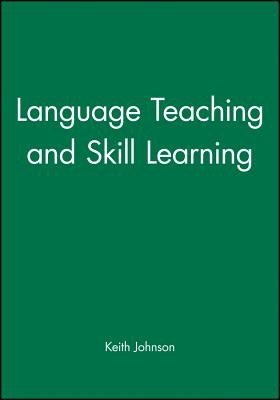
- Išsiųsime per 12–18 d.d.
- Autorius: Keith Johnson
- Leidėjas: Blackwell Publishers
- ISBN-10: 063116877X
- ISBN-13: 9780631168775
- Formatas: 15.3 x 22.9 x 1.7 cm, minkšti viršeliai
- Kalba: Anglų
- Extra -15 % nuolaida šiai knygai su kodu: ENG15
Atsiliepimai
Aprašymas
This book argues controversially that second-language acquisition has much in common with other forms of skill learning, and that there is much to be learned about the business of language teaching by considering the views and practices of teachers in other domains.
For many Applied Linguists, language is unique among human skills, incomparable in its acquisition and use to other forms of behaviour. Their study of second-language learning and teaching may thus draw on knowledge about first-language acquisition, but not on what is known about the learning of non-linguistic skills. This book argues against such an approach. It begins by considering arguments for and against the uniqueness of language. It reviews the recent literature in second-language acquisition, looking both at general learning theories (which account for language alongside other skills) and opposing theories (mostly based on the study of Universal Grammar). The book then turns to language teaching, and in a programmatic way considers what insights may be gained by viewing language within a general skills framework. Particular attention is given to how the teacher may help students to make consciously learned language automatic.
EXTRA 15 % nuolaida su kodu: ENG15
Akcija baigiasi už 3d.21:06:49
Nuolaidos kodas galioja perkant nuo 10 €. Nuolaidos nesumuojamos.

- Autorius: Keith Johnson
- Leidėjas: Blackwell Publishers
- ISBN-10: 063116877X
- ISBN-13: 9780631168775
- Formatas: 15.3 x 22.9 x 1.7 cm, minkšti viršeliai
- Kalba: Anglų Anglų
This book argues controversially that second-language acquisition has much in common with other forms of skill learning, and that there is much to be learned about the business of language teaching by considering the views and practices of teachers in other domains.
For many Applied Linguists, language is unique among human skills, incomparable in its acquisition and use to other forms of behaviour. Their study of second-language learning and teaching may thus draw on knowledge about first-language acquisition, but not on what is known about the learning of non-linguistic skills. This book argues against such an approach. It begins by considering arguments for and against the uniqueness of language. It reviews the recent literature in second-language acquisition, looking both at general learning theories (which account for language alongside other skills) and opposing theories (mostly based on the study of Universal Grammar). The book then turns to language teaching, and in a programmatic way considers what insights may be gained by viewing language within a general skills framework. Particular attention is given to how the teacher may help students to make consciously learned language automatic.


Atsiliepimai